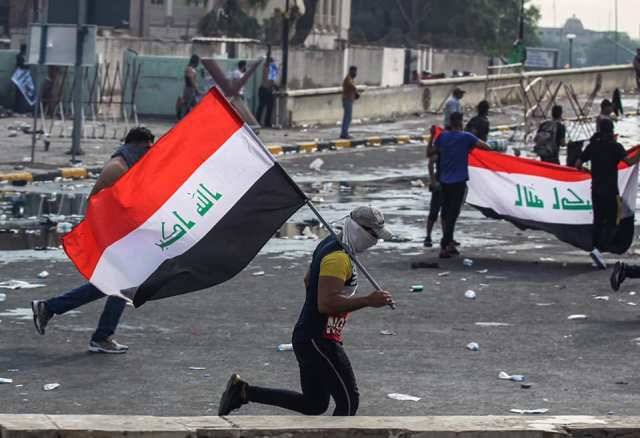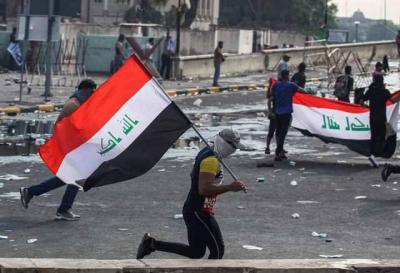Several Iranian and Iraqi sources told Reuters that the visit of Iranian Quds Force Commander Ismail Qaani to Baghdad led to a halt in attacks on American forces carried out by Iran-aligned factions in Iraq. Here is an overview of the most influential Shiite parties and armed factions in Iraq, which remain divided on how to deal with the presence of American troops in the country:
**Coordination Framework**
This Shiite ruling coalition consists of Iraqi parties and armed factions, and is the main supporter of Iraqi Prime Minister Mohammed Shia al-Sudani, who came to power in October 2022. Members of this coalition compete for power and resources, often disagreeing with one another. They are united in their opposition to Shiite cleric Muqtada al-Sadr. The coalition opposed attacks on American forces since the outbreak of the Gaza war, instead calling for their withdrawal through negotiations. Key leaders include:
- **Nouri al-Maliki**: A two-time former Prime Minister and leader of the Dawa Party, which has dominated successive Iraqi governments since 2003. Maliki has close ties with Iran, which supported Dawa's opposition to Saddam Hussein during the Iran-Iraq war in the 1980s. He has connections with armed factions and security agencies and is a staunch opponent of Sadr.
- **Hadi al-Amiri**: Leader of the Badr Organization, which emerged as an Iranian-backed Shiite armed faction in the 1980s. Badr is a significant part of the Popular Mobilization Forces, a security entity in Iraq that includes numerous Iran-aligned factions often operating outside command structures.
- **Qais Khazali**: A former fighter in the Sadr-affiliated Mahdi Army during confrontations with American forces before breaking away in 2006 to form the Asa'ib Ahl al-Haq, which has become a political military group with several parliamentary seats. Khazali's armed group actively engages on social media to disseminate messages from Iran-aligned factions.
- **Haider al-Abadi and Ammar al-Hakim**: Two moderate Shiite politicians who do not openly support any specific armed factions. Hakim is a cleric who led the Iraqi Islamic Supreme Council, a party founded in Iran that managed the Iraqi interior ministry after the U.S. invasion. Abadi, a former Prime Minister, is a prominent leader in the Dawa Party who led Iraq to defeat ISIS in 2017.
**Islamic Resistance in Iraq**
The Islamic Resistance in Iraq, which includes various Shiite armed groups aligned with Iran, has claimed responsibility for over 150 attacks on bases housing American forces in Syria and Iraq since October. The armed factions within this movement are components of the Popular Mobilization Forces and maintain good relations with factions in the Coordination Framework. The U.S. designates its main factions as terrorist organizations. Groups include:
- **Hezbollah Brigades**: Among the factions closest to Iran, it first entered the elections in 2021, winning several seats in parliament. It is accused of being behind attacks on American military and diplomatic targets in Iraq but does not publicly confirm or deny its involvement. Founded by Abu Mahdi al-Muhandis in 2005, al-Muhandis was killed in a U.S. airstrike in Baghdad in 2020 alongside Iranian General Qassem Soleimani. The group has no publicly announced leadership structure, but senior leader Abdul Aziz al-Muhandis serves as the chief of staff of the Popular Mobilization Forces. Washington has stated that the group is responsible for a January attack in Jordan that killed three American soldiers.
- **Nujaba Movement**: Formed as a branch of other armed factions, it has a strong presence in Syria, where it helped support the Assad regime during the Syrian civil war. It later fought against ISIS in Iraq and Syria. Under the leadership of Akram al-Kaabi, it announced the formation of a brigade in the Golan aimed at expelling Israeli forces from the occupied Golan Heights.
- **Sayed al-Shuhada Brigades**: This smaller armed faction also fought in Syria to support Assad and then against ISIS. It holds at least one parliamentary seat and is led by Abu Alaa al-Walai, a former member of Hezbollah Brigades.
**Muqtada al-Sadr and the Sadrist Movement**
Sadr, a cornerstone of the Iraqi Shiite scene for two decades, announced his exit from politics in 2021 after failing to form a government. Many Iraqi officials and analysts expect him to ultimately return. He led a rebellion against the American occupation of Iraq after the overthrow of Saddam Hussein. Sadr inherited followers, mostly from poor Shiite communities, from his father, a cleric who opposed Saddam and was killed for it. He portrays himself as a nationalist opposing all foreign interventions, particularly from Iran, and accuses his Shiite rivals of corruption. He has an armed group comprising thousands of fighters, known as Saraya al-Salam, and wields influence within the Iraqi state. His large supporter base enables him to play an active role in Iraqi politics.




